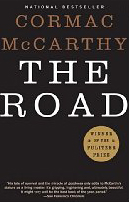Review of The Road by Cormac McCarthy

Cormac McCarthy sounds Irish but is an American writer of sparse brilliance. He is the author behind No Country for Old Men, but other well-known works are Blood Meridien and The Border Trilogy series, beginning with All the Pretty Horses.
I first became aware of McCarthy when I went to see The Sunset Limited, a play he wrote about a rescuer counselling a man who tries to commit suicide. The dialogue was sensational and sharp as tacks; and included a very deep understanding of Christianity
The Road was written just after that play. It won the Pulitzer Prize in 2007 and was released in Australia in 2008. The movie has been recently released to critical acclaim.
While not as overtly Christian in theme as the play, it is just as deeply moving and similarly raises some enormous questions. What if everything was stripped away by global disaster? What if all that was left was you (Dad) and your son, and your wits to survive?
What if you had to contend with post disaster ash, contaminated earth and water, marauding gangs, sickness with no medication, no electricity or services, or safe shelter…?
A man and his son make their way through a damaged landscape. Their lifeline is the road.
With the first gray light he rose and left the boy sleeping and walked out to the road and squatted and studied the country to the south. Barren, silent, godless. He thought the month was October but he wasn't sure. He hadn't kept a calendar for years. They were moving south. There'd be no surviving another winter here.
This is a gritty and real book, and for much of it I was dreading the next catastrophe. McCarthy manages to build enormous compassion for the father and son. I kept reading because I genuinely cared about what happened to them.
It is a painful read because we have to acknowledge our part in the environmental and political and social disaster that happens. I was reading this at the time of the debate over global warming; and much of it seemed like a warning of the horror that could come.
However it is much more intensely personal than that. It is about the significance of relationships, what happens when death is a daily companion, what happens to our ethical frameworks when survival is the ultimate concern.
The words and punctuation are cut down, the sentences are short. The writing matches the sparseness of life around. Most of the action is conveyed in thoughts and dialogue so there is a very narrow focus on what is happening. Much of the motivation to keep reading is to try and find out more.
Every now and then there is a glimpse, through a fragment of memory, a dream of what once was, and how it has degenerated to what is.
He'd wake in the black and freezing waste out of softly coloured worlds of human love, the songs of birds, the sun.
There is an acknowledgement of God, but a sense that they might have passed beyond his ability to reach. There is affirmation that God sees and knows, but a frustration with his lack of intervention. Yet there is hope, in the sense of goodness and providence, a light that is carried.
While the father has to make the tough decisions, it is the son who is willing to sacrifice in his desire to care for others. And surrounding them is the unmentionable presence of the mother, who left them physically a long time ago to increase their odds of survival. It gives off an essence of the trinity: a strange dance of justice and mercy and compassion.
It is impossible to read this book and not to be changed in some way; well definitely challenged in many ways. It is not a pleasure to read, perhaps more harrowing and emotionally exhausting, but it is a great and significant book.
KARA MARTIN is a lecturer with School of Christian Studies (www.socs.org.au), and is an avid reader and book group attendee. Kara does book reviews for Hope 103.2's Open House (www.theopenhouse.net.au)





















